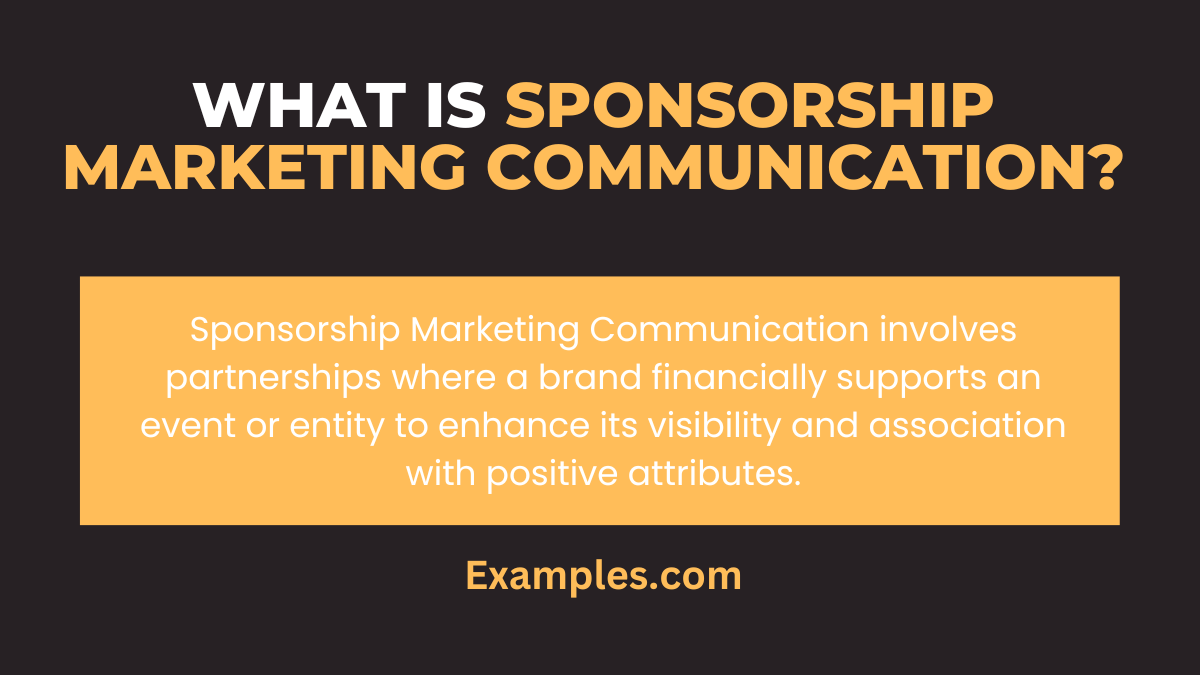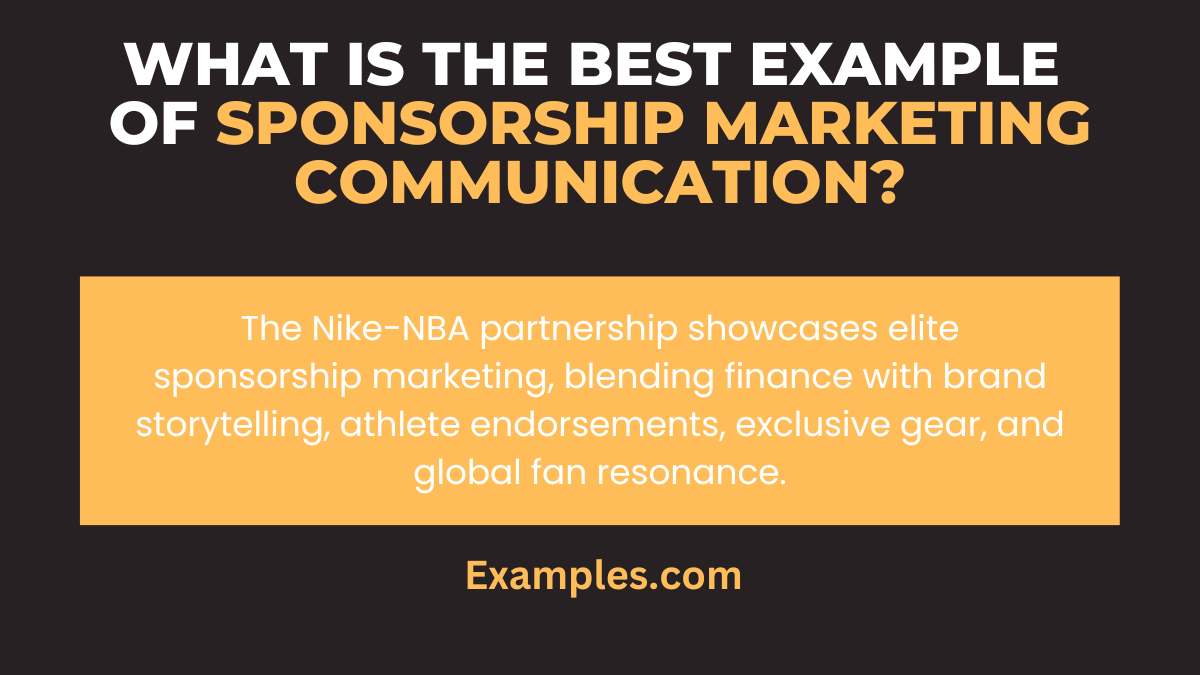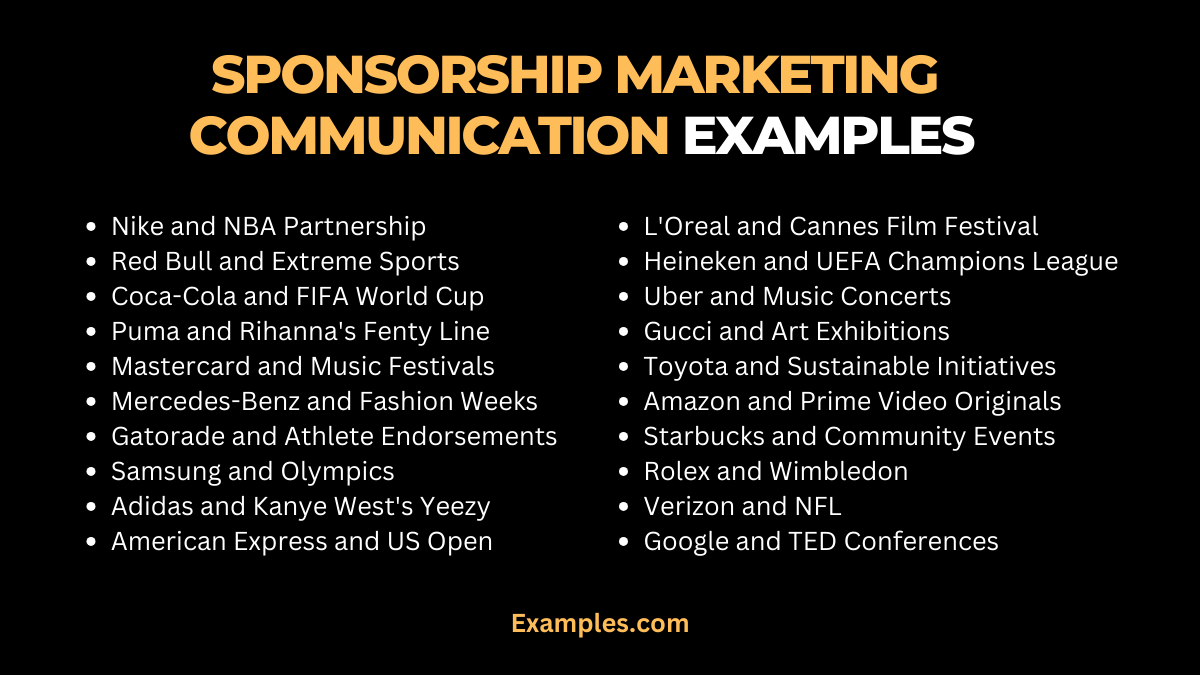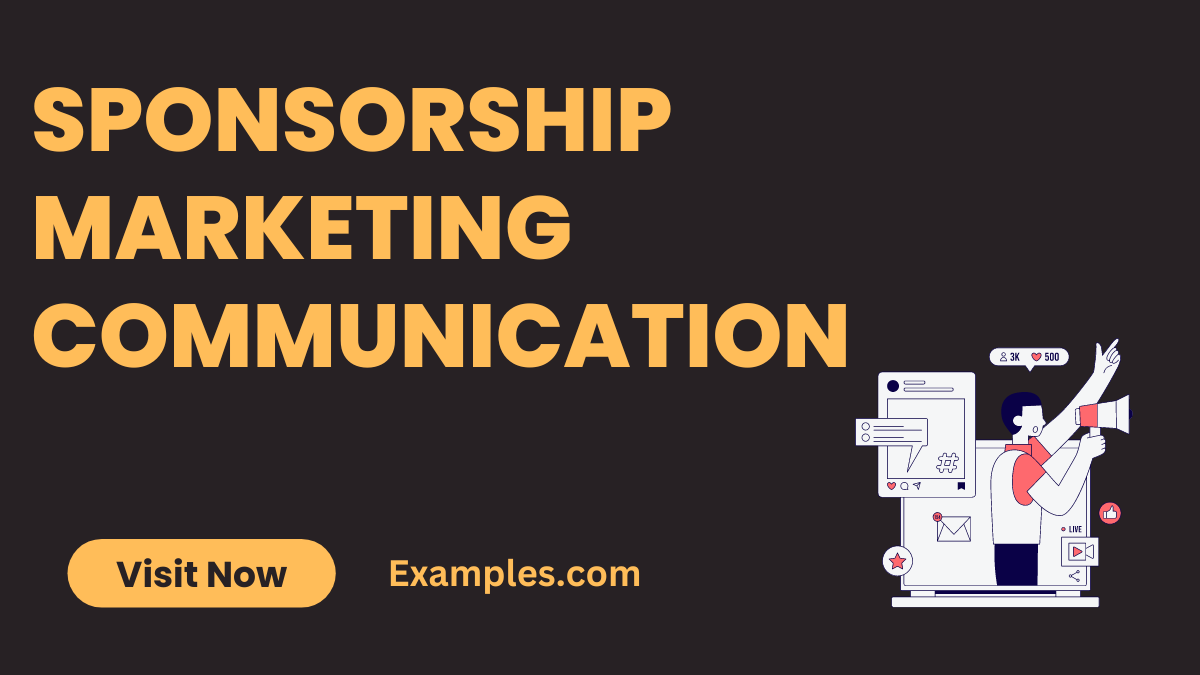Sponsorship Marketing Communication
Embark on a journey through the dynamic realm of Sponsorship Marketing Communication with our comprehensive guide. Uncover the strategies, tips, and real-world examples that define successful brand collaborations, making your sponsorship initiatives not just impactful but also communicative. Dive into a wealth of insights to understand the nuanced art of sponsorship and how it contributes to effective brand communication.
What is Sponsorship Marketing Communication?

Sponsorship Marketing Communication is a strategic collaboration between brands and sponsors to mutually elevate their messages. In simple terms, it’s a partnership where communication goals align, leveraging shared values for maximum impact. This collaboration extends beyond financial support, creating a unique channel to convey brand messages, values, and offerings to a wider audience through collaborative efforts.
What is the Best Example of Sponsorship Marketing Communication?

Explore the pinnacle of Sponsorship Marketing Communication through an exemplary case: The Nike and NBA Partnership. This dynamic collaboration not only involves financial support but strategically intertwines brand narratives. Through athlete endorsements, exclusive merchandise, and immersive experiences, Nike effectively communicates its commitment to athleticism, performance, and the spirit of the game, creating a powerful synergy that resonates with fans globally.
20 Sponsorship Marketing Communication Examples

Sponsorship Marketing Communication bridges brands and events, creating impactful collaborations. Explore these 20 diverse examples, each offering a unique perspective on leveraging partnerships for effective brand communication.
- Nike and NBA Partnership: Through athlete endorsements and exclusive merchandise, Nike communicates its commitment to athleticism and the spirit of the game.
- Red Bull and Extreme Sports: Red Bull’s sponsorship of extreme sports events effectively communicates its brand ethos of energy, excitement, and pushing boundaries.
- Coca-Cola and FIFA World Cup: By associating with the World Cup, Coca-Cola communicates joy, celebration, and the global unity brought by the sport.
- Puma and Rihanna’s Fenty Line: Puma communicates style and individuality through its collaboration with Rihanna, reflecting in the Fenty fashion line.
- Mastercard and Music Festivals: Supporting music festivals, Mastercard effectively communicates its commitment to unforgettable experiences and exclusive perks for cardholders.
- Mercedes-Benz and Fashion Weeks: Sponsoring fashion weeks, Mercedes-Benz communicates luxury, style, and innovation synonymous with its brand.
- Gatorade and Athlete Endorsements: Through athlete partnerships, Gatorade effectively communicates its dedication to sports performance and hydration.
- Samsung and Olympics: Samsung’s association with the Olympics communicates innovation, global connectivity, and cutting-edge technology.
- Adidas and Kanye West’s Yeezy: The collaboration with Kanye West in the Yeezy line helps Adidas communicate street-style influence and cultural relevance.
- American Express and US Open: By sponsoring the US Open, American Express communicates exclusivity and enhances its brand image among tennis enthusiasts.
- L’Oreal and Cannes Film Festival: L’Oreal’s presence at Cannes communicates glamour, sophistication, and its association with beauty and cinema.
- Heineken and UEFA Champions League: Sponsoring UEFA Champions League, Heineken communicates a premium football-watching experience and international camaraderie.
- Uber and Music Concerts: Uber’s sponsorship of music concerts communicates convenience and reliability, aligning with the dynamic nature of live events.
- Gucci and Art Exhibitions: By supporting art exhibitions, Gucci communicates creativity, luxury, and a commitment to the arts.
- Toyota and Sustainable Initiatives: Toyota’s sponsorship of eco-friendly events effectively communicates its commitment to sustainability and environmental responsibility.
- Amazon and Prime Video Originals: Through partnerships with film festivals, Amazon communicates its commitment to original content and innovation in the entertainment industry.
- Starbucks and Community Events: By supporting local events, Starbucks communicates a sense of community engagement and shared experiences.
- Rolex and Wimbledon: Rolex’s sponsorship of Wimbledon communicates precision, tradition, and a timeless commitment to excellence.
- Verizon and NFL: Verizon’s partnership with the NFL communicates connectivity, cutting-edge technology, and an enhanced fan experience.
- Google and TED Conferences: Google’s collaboration with TED Conferences effectively communicates its commitment to innovation, knowledge-sharing, and transformative ideas.
Sponsorship Marketing Communication Examples For Business
Unlock the potential of Sponsorship Marketing Communication for your business with these strategic examples. From tailored partnerships to impactful collaborations, discover how these businesses effectively communicate their brand messages through sponsorship.
- Microsoft and Tech Conferences: Microsoft sponsors tech conferences, communicating innovation and thought leadership in the industry.
- IBM and Sustainability Events: By sponsoring sustainability events, IBM effectively communicates its commitment to eco-friendly practices and corporate responsibility.
- LinkedIn and Professional Development Seminars: Supporting professional development seminars, LinkedIn communicates its dedication to career growth and networking.
- Adobe and Creative Workshops: Adobe sponsors creative workshops, effectively communicating its support for artistic expression and skill development.
- Salesforce and Business Expos: Through sponsorship of business expos, Salesforce communicates its role as a key player in the business solutions landscape.
Sponsorship Marketing Communication Examples in Advertising
Explore how sponsorship intertwines with advertising to create compelling narratives and enhance brand communication. These examples showcase the dynamic fusion of sponsorship and advertising strategies.
- Nike and Athlete Commercials: Nike seamlessly integrates athlete sponsorships into commercials, effectively communicating the brand’s commitment to excellence and sportsmanship.
- Coca-Cola and Event Broadcasts: Coca-Cola sponsors event broadcasts, enhancing its advertising reach and effectively communicating joy and refreshment to a global audience.
- Google and Educational Webinars: Through sponsoring educational webinars, Google effectively communicates its commitment to knowledge-sharing and technological advancements.
- Apple and Film Festival Trailers: Apple sponsors film festival trailers, effectively aligning its brand with creativity, innovation, and cutting-edge storytelling.
- Amazon and Prime Day Sponsorships: Amazon sponsors events during Prime Day, leveraging advertising to effectively communicate exclusive deals and the excitement of the shopping event.
What is the Role of Sponsorship in Marketing Communication?
Sponsorship in marketing communication plays a pivotal role in forging meaningful connections between brands and their target audiences. It goes beyond traditional advertising, creating immersive experiences that effectively convey brand messages and values.
- Brand Exposure and Visibility: Sponsorship provides a platform for heightened brand exposure, increasing visibility among the target demographic.
- Enhanced Credibility and Trust: By associating with events or causes, sponsorship helps build credibility, fostering trust among consumers who view the brand as supportive and reputable.
- Targeted Audience Engagement: Sponsoring events allows brands to engage with their specific target audience, tailoring communication strategies to resonate with a receptive demographic.
- Differentiation and Competitive Edge: Strategic sponsorships set brands apart from competitors, offering a unique channel for communication that distinguishes them in the market.
- Emotional Connection with Consumers: Associating with meaningful causes or events facilitates an emotional connection, making the brand more relatable and resonant with consumers.
- Long-Term Relationship Building: Sponsorship contributes to the establishment of enduring relationships, as continuous support fosters loyalty and a sense of community among consumers.
Why is Sponsorship Important in Marketing Communication?
Sponsorship holds significant importance in marketing communication due to its ability to create impactful, memorable experiences that traditional advertising might struggle to achieve.
- Extended Reach and Audience Expansion: Sponsorship allows brands to extend their reach beyond traditional marketing channels, tapping into new audiences through events or partnerships.
- Positive Brand Association: Aligning with events or causes that reflect positive values enhances brand perception, creating a favorable association in the minds of consumers.
- Dynamic Storytelling Opportunities: Sponsorship provides a dynamic platform for storytelling, allowing brands to narrate their stories through the context of events, fostering a deeper connection with the audience.
- Community Engagement and Interaction: Brands engaging in sponsorships actively participate in communities, facilitating direct interactions with their audience and strengthening relationships.
- Influence and Thought Leadership: Sponsoring events positions brands as influencers and thought leaders in their respective industries, reinforcing their authority and expertise.
- Real-Time Adaptability and Flexibility: Unlike traditional campaigns, sponsorships offer real-time adaptability, enabling brands to respond swiftly to market changes and consumer trends for more effective communication.
What Objectives are Associated with Sponsorship Marketing Communication?
Understanding the specific objectives associated with sponsorship marketing communication is crucial for developing targeted and impactful strategies.
- Brand Awareness and Recall: The primary objective is to enhance brand awareness and ensure that the brand remains memorable in the minds of the target audience.
- Consumer Engagement and Interaction: Sponsorship aims to foster engagement and interaction with consumers, creating meaningful touchpoints that go beyond one-time exposures.
- Strategic Market Positioning: Sponsorship is often utilized to strategically position a brand in the market, associating it with values and themes that resonate with the target demographic.
- Driving Sales and Conversions: Effective sponsorship should contribute to driving sales and conversions by converting positive brand perception into tangible consumer actions.
- Establishing Corporate Social Responsibility (CSR): Many sponsorships align with CSR initiatives, aiming to communicate a brand’s commitment to social and environmental responsibility.
- Building Long-Term Brand Loyalty: Ultimately, sponsorship marketing communication seeks to build enduring brand loyalty, creating a base of dedicated consumers who remain loyal to the brand over time.
In conclusion, Sponsorship Marketing Communication is a dynamic strategy that goes beyond traditional advertising, fostering authentic connections between brands and audiences. This comprehensive guide, enriched with diverse examples, unveils the power of sponsorship to create impactful narratives. By leveraging partnerships, businesses can elevate their brand communication, leaving a lasting impression and cultivating enduring relationships with their target demographics.



